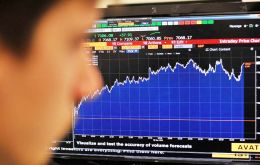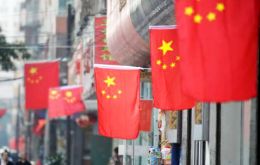MercoPress. South Atlantic News Agency
Tag: China's market economy status
-
Wednesday, May 24th 2017 - 08:36 UTC
World's second largest economy has its credit rating downgraded by Moody's

China has received a downgrade on its credit score, on worries about the future state of the economy. Moody's Investors Services brought down China's long-term local currency and foreign currency issuer ratings by one notch to Aa3 from A1, a move that could lead to a rise in the cost of borrowing for the Chinese government and state-owned enterprises. The ratings agency also changed its outlook for China to stable from negative.
-
Thursday, February 16th 2017 - 12:30 UTC
China admits cooking stats numbers; pledges to punish data fraud

China must fight against data fraud and improve the quality of the country’s economic data, the head of the National Bureau of Statistics said, the second central government official over the past week to comment on the accuracy of economic data.
-
Saturday, January 21st 2017 - 11:11 UTC
China's economy picks up slightly in 2016 but the rebound is below expectations

China's economy grew by 6.7% in 2016, compared with 6.9% a year earlier, marking its slowest growth in more than a quarter of a century. China's growth is a key driver of the global economy and a major concern for investors around the world. The figure is in line with Beijing's official growth target of between 6.5% and 7%.
-
Tuesday, November 3rd 2015 - 12:38 UTC
Chinese manufacturing contracts for third month running

Chinese manufacturing has contracted for the third month in a row, according to the government's latest factory survey. The Purchasing Managers' Index (PMI) showed a reading of 49.8 for October, unchanged from last month. A figure below 50 indicates that factory activity contracted.
-
Monday, September 1st 2014 - 16:49 UTC
China's manufacturing misses expectations in August; stimulus considered

China's manufacturing activity missed expectations in August, indicating that the country's economy may be losing momentum and require more stimulus. The official purchasing managers index (PMI) fell to 51.1 for the first time in seven months from 51.7 in July, the National Bureau of Statistics said.
-
Tuesday, February 7th 2012 - 06:09 UTC
China growth could drop by half in 2012 because of the Euro crisis warns IMF

Economic growth in China could drop by half this year in the event of a sharp recession in Europe, the IMF predicted on Monday in a report that underscored the importance of global trade to the world's second largest economy.
-
Friday, June 10th 2011 - 05:17 UTC
Chile is China’s “gateway to Latin America” and its unique ally in the region

China Vice-President Xi Jinping arrived in Chile Thursday to forge closer ties with the nation that has branded itself as China's “gateway to Latin America”.
